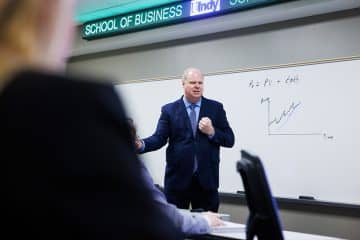How MBA Students Can Prepare for On-Campus Recruiting
One of the most valuable aspects of an MBA program is the opportunity for employers and big-name companies to visit campus and meet you face-to-face. Career fairs and other recruiting events allow you to make a series of great first impressions with desirable employers all at once, getting you that much closer to securing a fulfilling career. Keep the following points in mind to ensure that you put your best foot forward and make the most of your campus recruiting event.
1. Do Your Research
Prior to the session, find out which companies will be visiting campus. Take note of what each organization does and generally how they operate. It is also helpful to get as much of a handle as possible on the mission and values that each company holds.
With a firm grasp on each company, you will be able to start thinking how your own skills and goals match up with their needs. And not only will this help you understand which companies interest you the most, but it will also give you great talking points for each meeting you have. Your research will help you have an active and engaged conversation with each recruiter you speak to.
2. Practice Your Pitch
On-campus recruiters have a genuine interest in meeting you, but they are also interested in meeting all of the other MBA candidates who are attending the event. This is exactly where your elevator pitch comes in handy. Get a grasp on the skills and ambitions you want to present to the recruiters, practicing how you can fit your professional description into a short and easy-to-follow (and nevertheless impactful) statement.
There will be enough time for you to have a conversation with the recruiters, but you also want to make sure that you squeeze your main talking points into the short time that you are guaranteed to have.
3. Prepare Your Portfolio.
Come to the career event with a ready stack of résumés to hand to recruiters. Your first impression and elevator pitch must be matched with a résumé to which the recruiters and other members of the company can refer.
Spruce up your portfolio and make sure to include your current education as well as the professional experiences you have gained thus far during your MBA program. Your résumé will be even stronger if you take the time to tailor it to each company coming to recruit. Leverage the experiences you’ve had that demonstrate both your adaptability as well as the skills that would be most valuable for the companies in question.
4. Rehearse for Interviews.
Recruiting events do not always have full-on interviews with MBA students, but the time you do have with the companies’ representatives act essentially as your first round of interviews with them. Make a visit to your career development office to have a coach help you brush up on your interviewing skills. The staff will be able to relay how a recruiting conversation may go as well as give feedback on your practice run.
5. Make the Right Impression.
Recruitment events are critical moments in your pursuit for a career. Treat this like any other job interview and approach the session with a strong sense of professionalism. Dress for success, keep your energy up, and make an effort to stand out. Be friendly with the recruiters and connect with them in a way that will make them remember you. Remember, there will be plenty of other MBA students around, all of whom have the same goal as you. Put in the effort to show your knowledge of the company and your ability as a potential employee.
6. Follow Through.
It’s not enough to throw your résumé at a recruiter and disappear in hopes that they’ll follow up. Take the initiative to collect the business cards and contact information so that you can reach back out later. Follow up with each person you met with a note that thanks them for their time and interest. Put care into mentioning a memorable point of your conversation so that they can more easily remember you.
All of these steps and your attention to detail will have a lasting effect on how favorably recruiters remember you. Among all the other MBA students they meet, it is your goal to stand out in their mind when they report back to the others at their organization.





